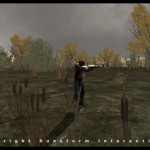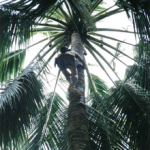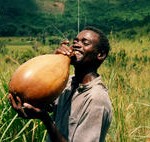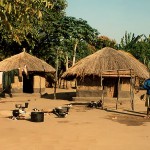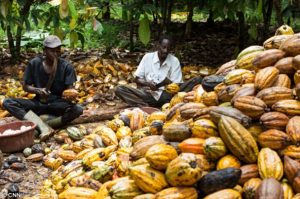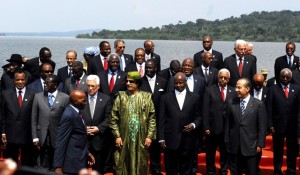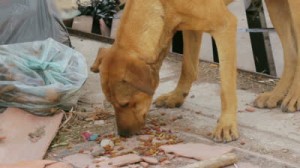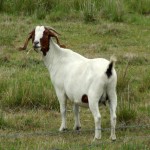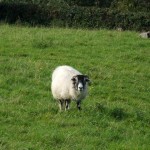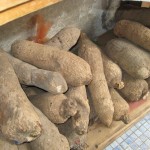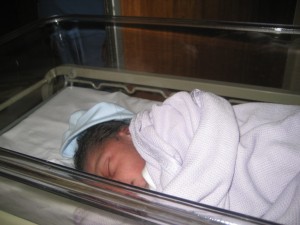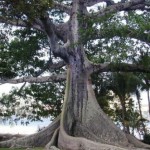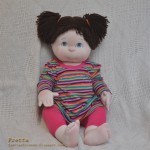Ọkunrin kan wa láyé àtijọ́, Ògbójú-ọdẹ ni, ṣùgbọ́n bi ó ti pa ẹran tó, kò fi dá nkan ṣe. Ọ̀pọ̀ igbà, ki ri ẹran ti ó bá pa tà, o ma ńpin fún ará ilú ni. Nigbati kò ri ẹran pa mọ́, ó di o Ọdẹ-apẹyẹ.
- Ògbójú-ọdẹ – Great Hunter
- Adẹ́mu – Palm-wine Tapper
- Ẹlẹ́mu – Palm-wine seller
Ni ọjọ kan, ògbójú-ọde yi ri ẹyẹ Òfú kan, ṣùgbọ́n ọta ibọn kan ṣoṣo ló kù ninú ibọn rẹ. Gẹgẹbi Ògbójú-ọdẹ, o yin ẹyẹ Òfú ni ibọn, ọta kan ṣoṣo yi si báa. Ó bá wọ igbó lọ lati gbé ẹyẹ ti ó pa, lai mọ̀ pé ẹyẹ yi kò kú. Ó ṣe akitiyan lati ri ẹyẹ́ yi mu, kẹ̀rẹ̀kẹ̀rẹ̀ ó bẹ̀rẹ̀ si wọ igbó lọ titi ó fi ṣi ọ̀nà dé ilẹ̀ àwọn Ará-Ọ̀run – àwọn ti wọn ńpè ni Abàmi-ẹ̀dá. Inu bi àwọn Ará-Ọ̀run nitori Ògbójú-ọdẹ yi jálu ipàdé wọn. Wọn gbamú, wọn ni ki ó ṣe àlàyé bi ó ṣe dé ilẹ̀ wọn, ki àwọn tó pá. Ọdẹ ṣe àlàyé ohun ti ojú rẹ ti ri nipa iṣẹ́ àti jẹ àti gbogbo ohun ti ojú rẹ ti ri lẹ́nu iṣẹ́ ọde. Àwọn Ará-Ọ̀run ṣe àánú rẹ, wọn bèrè pé ṣe ó lè dá ẹmu, ó ni ohun lè dá ẹmu diẹ-diẹ. Wọn gbaa ni iyànjú pé ki o maṣe fi ojú di iṣẹ kankan, nitori naa, ki ó bẹ̀rẹ̀ si dá ẹmu fún àwọn.
Wọn ṣe ikilọ pe, bi ó bá ti gbé ẹmu wá, kò gbọdọ̀ wo bi àwọn ti ńmu ẹmu, ki ó kàn gbé ẹmu silẹ ki o si yi padà lai wo ẹ̀hin. Bi ó bá rú òfin yi, àwọn yio pa. Ọdẹ bẹ̀rẹ̀ si gbé ẹmu lọ fún ara orun. Bi ó bá gbé ẹmu dé, a bẹ̀rẹ̀ si kọrin lati jẹ ki àwọn Ará-Ọ̀run mọ̀ pé ohun ti dé, lẹhin èyi á gbé ẹmu silẹ á yi padà lai wo ẹ̀hin gẹgẹ bi ikilọ Ará-Ọ̀run. Ni ọjọ́ keji, á bá owó ni idi agbè ti ó fi gbé ẹmu tàná wá. Ògbójú-ọdẹ á má kọrin bayi:
Ará Ọ̀run, Ará Ọ̀run
Ìnọ̀mbà téré, tere múdè, ìnọ̀mbà
Ará Ọ̀run, Ará Ọ̀run o,
Ìnọ̀mbà téré, tere múdè, ìnọ̀mbà
Ki lo wá ṣe n’ilẹ̀ yi o
Ìnọ̀mbà téré, tere múdè, ìnọ̀mbà
Ẹmu ni mo wá dá,
Ìnọ̀mbà téré, tere múdè, ìnọ̀mbà
Èlèló lẹmu rẹ
Ìnọ̀mbà téré, tere múdè, ìnọ̀mbà
Ọ̀kànkàn ẹgbẹ̀wá,
Ìnọ̀mbà téré, tere múdè, ìnọ̀mbà
Gbẹ́mu silẹ ko maa lọ
Ìnọ̀mbà téré, tere múdè, ìnọ̀mbà
Ará Ọ̀run, Ará Ọ̀run o,
Ìnọ̀mbà téré, tere múdè, ìnọ̀mbàaa
Àyipadà dé fún Ògbójú-ọdẹ ti ó di Ẹlẹ́mu tóó bẹ̀ ti àwọn ará ilú ṣe akiyesi àyipadà yi. Yorùbá ni “ojú larí, ọ̀rẹ́ ò dénú”. Àjàpá, ọlọ́gbọ́n ẹ̀wẹ́, sọ ara rẹ̀ di ọrẹ kòrí-kòsùn pẹ̀lú Ògbójú-ọdẹ nitori àti mọ idi ọrọ̀ rẹ. Laipẹ, àrùn Ṣọ̀pọ̀ná bo Ògbójú-ọdẹ, eleyi dá iṣẹ́ àti gbé ẹmu fún àwọn Ará-Ọ̀run dúró. Gẹgẹbi ọ̀rẹ́, ó bẹ Àjàpá pé ki ó bá ohun bẹ̀rẹ̀ si gbé ẹmu lọ fún àwọn Ará-Ọ̀run. Ó ṣe ikilọ fún Àjàpá, bi ikilọ ti àwọn Ará-Ọ̀run fi silẹ̀. Àjàpá, bẹ̀rẹ̀ si gbé ẹmu lọ, ni ọjọ́ keji ti ó ri owó rẹpẹtẹ ti àwọn Ará-Ọ̀run kó si idi agbè ẹmu àná, ó pinu lati mọ idi abájọ. Àjàpá, fi ara pamọ́ si igbó lati wo bi àwọn Ará-Ọ̀run ti ńmu ẹmu. Ohun ti ó ri yàá lẹ́nu, ó ri Ori, Ẹsẹ̀, Ojú, Apá àti àwọn ẹ̀yà ara miran ti wọn dá dúró, ti wọn si bẹ̀rẹ̀ si mu ẹmu. Àjàpá, bẹ̀rẹ̀ si fi àwọn Ará-Ọ̀run ṣe yẹ̀yẹ́. Nigbati wọn gbọ, wọ́n le lati pá ṣùgbọ́n, Àjàpá, sá àsálà fún ẹmi rẹ, ó kó wọ inú ihò, wọn kò ri pa. Continue reading
Originally posted 2014-07-18 20:50:09. Republished by Blog Post Promoter


